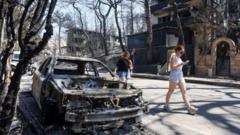Are Wildfires Sweeping Southern Europe Due to Scorching 40C Heat?

A Scorching Heatwave Fuels Wildfires Across Southern Europe
As the summer sun blazes down, southern Europe finds itself in the grips of an intense heatwave, leading to a surge in wildfires that threaten lives, homes, and natural landscapes. With temperatures soaring above 40°C (104°F), several regions are grappling with the devastating consequences of extreme heat and dry conditions. This alarming phenomenon is not just a temporary discomfort but a stark reminder of the pressing challenges posed by climate change.
In recent weeks, red heat alerts have been issued across Italy, France, Spain, Portugal, and the Balkans. These alerts signal significant risks to health and safety, as authorities urge citizens to exercise caution. Spain's weather service, Aemet, has indicated that temperatures could soar to an astonishing 44°C (111.2°F) in cities like Seville and Cordoba. The situation is dire, prompting evacuation orders and mobilization of emergency services as the region battles multiple wildfires.
The Human Toll of the Heatwave
The impact of this heatwave is tragically evident. In Italy, a child succumbed to heatstroke, highlighting the extreme risks associated with soaring temperatures. This heartbreaking incident is compounded by reports from Spain, where a man died from severe burns sustained in a wildfire. These personal tragedies underscore the urgent need for awareness and preparedness in the face of such climatic extremes.
In Tres Cantos, a town north of Madrid, residents have been forced to evacuate as wildfires rage nearby. The regional environment minister described the fires as having "explosive characteristics" due to dry storm conditions and powerful winds. With winds exceeding 70 km/h (43.5 mph), the situation is precarious, prompting Spanish Prime Minister Pedro Sanchez to mobilize rescue services and urge citizens to remain vigilant.
Evacuations and Emergency Responses
In Spain's northwestern region of Castile and Leon, nearly 4,000 people have been evacuated due to the threat of wildfires, with over 30 separate blazes reported. One major fire is dangerously close to Las Medulas, a UNESCO World Heritage site known for its ancient gold mines. Meanwhile, another 2,000 individuals were evacuated from hotels and homes near the popular tourist destination of Tarifa in Andalusia.
To combat the raging wildfires, nearly 1,000 soldiers have been deployed across Spain. The national military emergency unit is actively engaged in firefighting efforts, reflecting the seriousness of the situation. The scale of the response underscores the challenges that come with battling wildfires exacerbated by extreme heat and dry conditions.
Portugal's Battle Against Wildfires
Portugal is also feeling the heat, as firefighters contend with three large wildfires, the most severe of which is located near Trancoso. A total of over 1,300 firefighters and 14 aircraft have been dispatched to address these blazes. Notably, Morocco has stepped in to assist by sending two planes to aid firefighting efforts, particularly after Portuguese water bombers encountered technical issues.
Authorities in Portugal warn that southern regions may experience temperatures reaching 44°C, with nighttime temperatures not expected to dip below 25°C. This prolonged heat presents serious health risks and adds pressure to emergency services already stretched thin by ongoing firefighting operations.
Widespread Heat Alerts Across Europe
The heatwave's impact is felt beyond the Iberian Peninsula. In France, nearly three-quarters of the country are under heat alerts, with forecasted temperatures exceeding 36°C in the Paris region and hitting 40°C in the Rhône Valley. French Health Minister Catherine Vautrin has warned that hospitals are bracing for the impacts of what is now the second heatwave in just weeks. The situation is further exacerbated by record-breaking temperatures recorded at 80 weather stations, with 58 stations setting all-time highs.
Greece is not spared either, as gale-force winds have fanned fires on popular tourist islands such as Zakynthos and Cephalonia. Evacuations have become necessary as flames encroach on residential areas, raising concerns for both locals and tourists. In addition, Turkey's northwestern Canakkale province has seen major fires forcing hundreds from their homes, prompting a significant aerial response to combat the flames.
The Environmental Consequences
The ongoing wildfires and extreme heat serve as a stark reminder of the environmental changes occurring globally. Scientists warn that global warming is making Mediterranean summers hotter and drier, contributing to longer and more severe fire seasons. This cycle of extreme weather not only threatens human life but also has devastating consequences for biodiversity and ecosystems that are already under stress due to climate change.
In Albania, wildfires have forced residents to evacuate, while Croatia has battled a significant fire in Split, which has since been contained. The situation in Montenegro is equally dire, with a major wildfire sweeping through Piperi village, destroying homes and threatening the livelihoods of those in the area. These incidents highlight the widespread nature of the threat posed by wildfires across southern Europe.
The UK’s Heatwave Experience
Even the UK is not immune to the effects of this persistent heatwave. Parts of the country are experiencing their fourth heatwave of the year, with amber and yellow heat health alerts issued for all of England. As temperatures are forecast to rise to 34°C, the UK faces its own set of challenges related to public health and safety amid this unprecedented heat.
Adapting to a Changing Climate
As southern Europe grapples with the consequences of this intense heatwave, it is crucial to reflect on the broader implications of climate change. The frequency and intensity of such weather events are expected to increase, prompting a need for proactive measures in disaster preparedness and response. Communities must come together to develop strategies that mitigate the risks associated with extreme weather and protect vulnerable populations.
FAQs
What causes heatwaves and wildfires in southern Europe?
Heatwaves in southern Europe are primarily caused by a combination of high-pressure systems and climate change. These conditions create prolonged periods of extreme heat, which can lead to drought and increased fire risk.
How can individuals prepare for heatwaves?
To prepare for heatwaves, individuals should stay hydrated, avoid strenuous outdoor activities during peak heat hours, and ensure they have access to cooling resources. It's also important to check on vulnerable individuals, such as the elderly or those with health conditions.
What measures are being taken to combat wildfires?
Firefighting efforts typically include the deployment of firefighters, the use of aerial support such as water-bombing aircraft, and evacuation protocols for affected communities. Governments may also implement controlled burns and firebreaks to prevent the spread of wildfires.
What role does climate change play in increasing wildfires?
Climate change contributes to hotter, drier conditions that create an ideal environment for wildfires to ignite and spread. Increased temperatures and prolonged drought periods are linked to higher frequency and intensity of fire seasons.
The current heatwave and its accompanying wildfires serve as a critical reminder of the urgent need for climate action and preparedness. As we witness these alarming trends, it begs the question: how can we better equip ourselves and our communities to face the challenges posed by an increasingly unpredictable climate? #ClimateChange #Heatwave #Wildfires
Published: 2025-08-12 15:18:12 | Category: world



